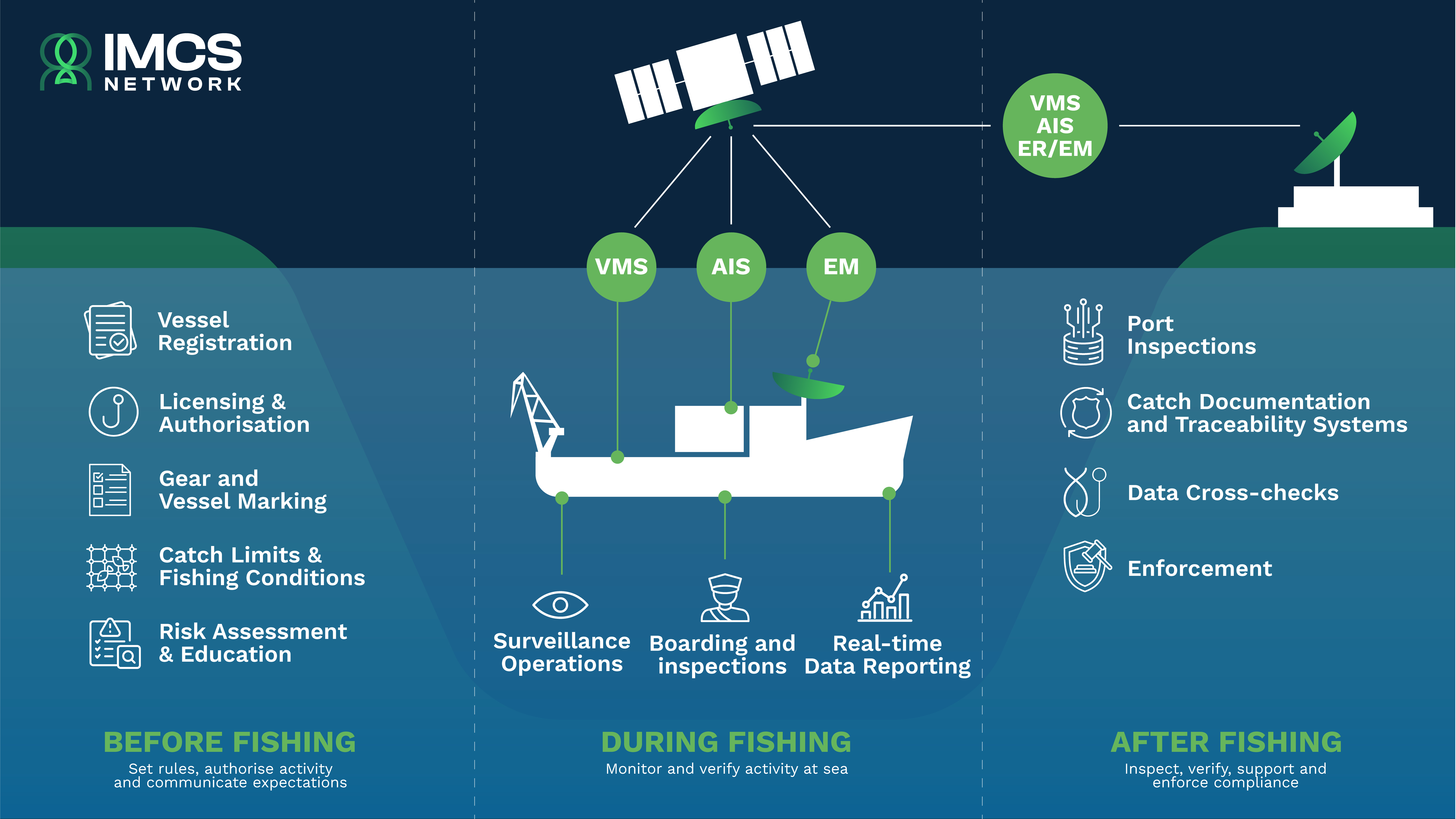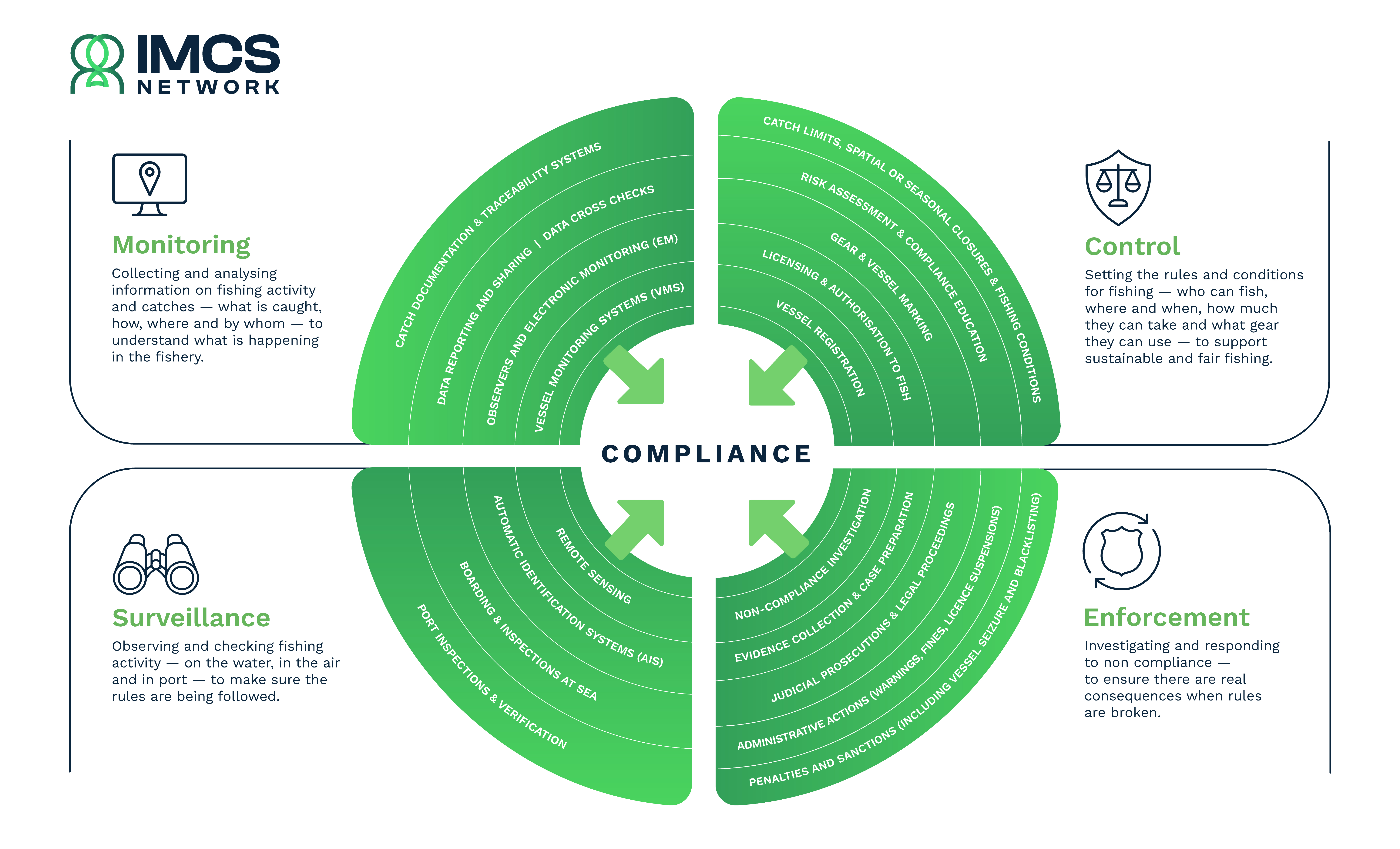Let me highlight something upfront: I’m that person. The one who gets a slight twitch when someone uses “enforcement” when they mean “compliance,” or lumps every fisheries offence into the giant, unwieldy bucket called “IUU fishing.”
But hear me out: I’m not splitting hairs just for fun (okay, maybe a tiny bit for fun). The long-term conservation and sustainable use of marine resources depends on getting compliance right — and to do that, we first need to be clear about what we’re talking about.
So allow me my moment on the soapbox. Ooo, it’s unsteady up here. Anyway, I digress.
What is MCS?
Think of Monitoring, Control and Surveillance (MCS) as the eyes, ears, and muscle of fisheries management. It’s how we gather information (monitoring), set rules and frameworks (control), and keep watch to check that everyone’s doing what they should (surveillance).
MCS provides the tools: patrol vessels, satellite tracking, observer reports, data analytics — and yes, the paperwork that nobody wants to fill out but everyone complains about when it’s missing.
I like to think of the M and S as covering activities before fishing, during fishing, and after fishing — all held together by the control framework. Cue cool infographic!

Importantly, MCS components don’t operate in isolation; they’re part of a bigger, integrated strategy. When designed and implemented well, they support compliance by making it easy to do the right thing and hard to get away with doing the wrong thing.
Compliance: The Goal
Here’s where we sometimes get lost: compliance isn’t just about catching people who break the rules. It’s about creating systems where people want — or at least find it easy — to follow the rules.
Compliance is the outcome: fishers adhering to laws and conservation measures that protect stocks, ecosystems, and communities.
Good compliance comes from legitimacy, clarity, fairness, support, and incentives. That might mean market benefits, fewer inspections for good performers, or the stability that comes from rules that are clear and fairly applied.

Enforcement: The Stick
Enforcement is where consequences for non-compliance kick in: inspections, investigations, fines, prosecutions, and (in extreme cases) vessel seizures. Enforcement ensures the rules mean something.
But it’s not the same as compliance. Enforcement is reactive. Compliance, ideally, is proactive.
And here’s the catch (go me, I made a pun!): used poorly, enforcement can backfire. Treating willing fishers like criminals demotivates them. Failing to apply meaningful consequences to repeat offenders only fuels more non-compliant behaviour. It’s a delicate balance.
Why It Matters
If we conflate these terms, we risk losing sight of our mission. We’re not here to write tickets or tally flashy enforcement stats. We are here for healthy oceans, sustainable fisheries, and resilient communities.
MCS provides the tools. Compliance is the goal. Enforcement is the safety net.
Mixing them up creates systems that are blunt, costly, and sometimes counterproductive — more about punishment than problem-solving and alienating the very fishers we need on our side.
So What About IUU?
Illegal, Unreported, and Unregulated fishing — it’s a useful umbrella term, but not always operationally helpful. Illegal fishing breaks the rules, unreported fishing is fishing that isn’t properly documented, and unregulated fishing takes place where no rules exist or apply. Grouping all offences together can blur these differences and lead us to treat symptoms of non-compliance rather than the causes.
Effective compliance responses require understanding the specific context and motivations behind each offence. They need to be risk‑based, targeted, and adaptive — not one‑size‑fits‑all.

The Point?
Are you still with me? Good. So what’s the point of all this, I hear you ask? Well, aside from giving me a break from staring at budget spreadsheets.... because words matter. Getting the terminology right helps us keep our eyes on the real prize: sustainable fisheries, healthy ecosystems and resilient communities. Ultimately, fisheries compliance isn’t about ticking boxes or writing reports, it’s about:
- Preventing overfishing and protecting fish stocks.
- Conserving marine ecosystems and biodiversity.
- Ensuring fair access and benefits for those who depend on the sea.
- Promoting safe and legal working conditions for those at sea.
- Combating IUU fishing in all its forms.
Let’s keep talking, clearly, and working toward sustainable fisheries — one well‑defined term at a time.

